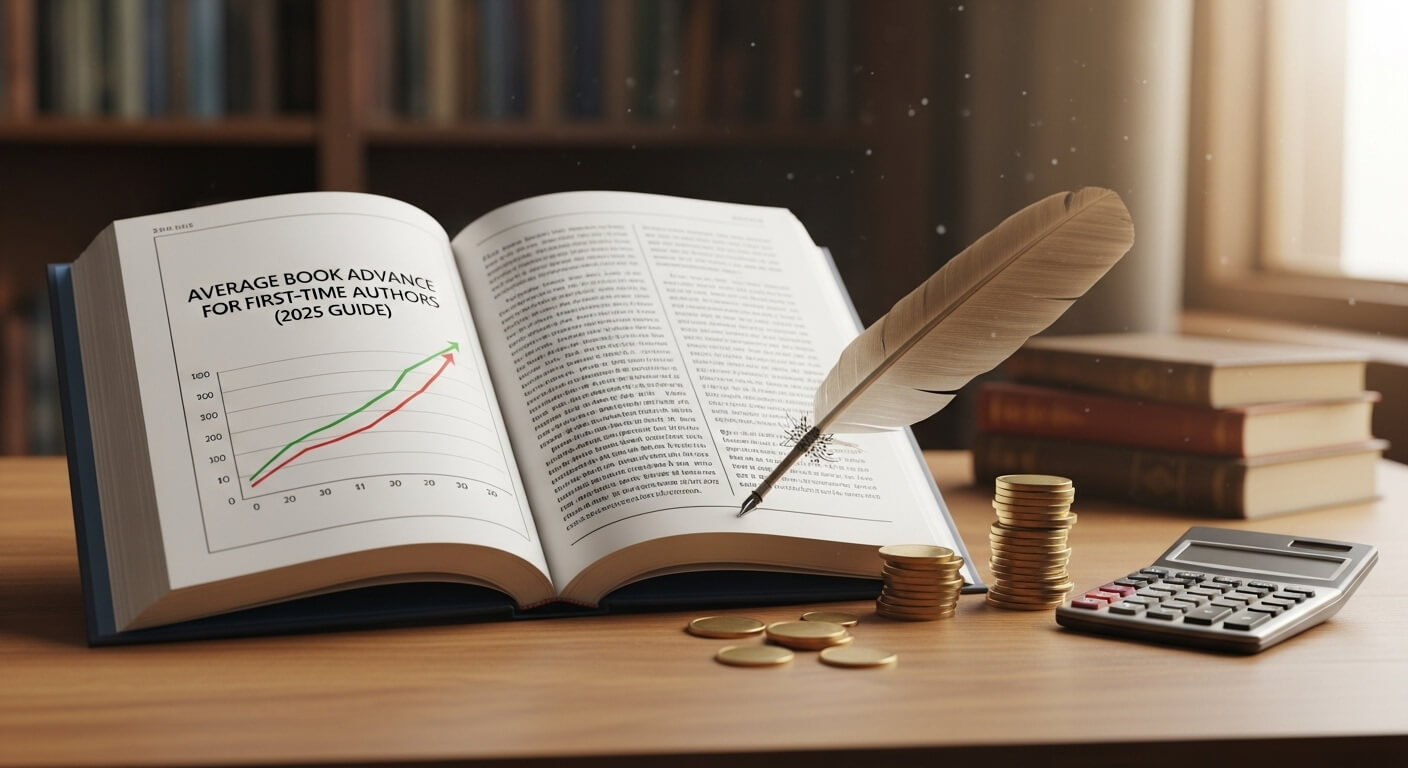
Breaking into the world of traditional publishing raises countless questions for new writers, but one stands out above all: What kind of advance can a first-time author expect in 2025? While stories of million-dollar book deals make headlines, the reality is far more nuanced. This guide offers a fresh, practical look at advances today—how they work, what determines their size, and what debut authors should realistically expect.
Table of Contents
ToggleUnderstanding Book Advances in Simple Terms
A book advance is an upfront payment a publisher offers when they acquire a manuscript. Think of it as a financial vote of confidence. The publisher estimates future book sales and pays you a portion of those expected royalties ahead of time.
Here’s how it works:
- The advance offsets future royalties. If you receive a $12,000 advance, you won’t earn additional royalties until book sales generate $12,000 in royalty earnings.
- Advances are usually non-refundable, even if sales fall short.
- Payments often arrive in stages—such as contract signing, manuscript delivery, and publication—rather than in one lump sum.
What Is the Average Advance for First-Time Authors in 2025?
In 2025, most debut authors can expect advances in the $5,000–$15,000 range. While some secure more generous sums, this bracket remains the most common starting point.
Current Ranges by Publisher Type
- Small Presses: $1,000 – $5,000
- Independent/Regional Publishers: $3,000 – $10,000
- Mid-Sized Publishers: $10,000 – $40,000
- Large Trade Houses (Big Five): $50,000 – $100,000+
- Exceptional Deals: Six- to seven-figure advances (rare, usually tied to high-profile authors, celebrities, or competitive auctions)
The reality: most first-time authors will see something closer to the low five-figure mark than a life-changing payout.
Why Advances Differ So Widely
Several factors shape the size of a debut advance:
- Market Potential – Books with strong commercial appeal (romantic comedies, thrillers, fantasy epics) often generate higher offers than highly niche or academic works.
- Timing and Trends – If your manuscript aligns with a hot cultural topic, your advance could benefit.
- Author Platform – A built-in audience (newsletter subscribers, TikTok followers, a strong professional reputation) signals lower risk to publishers.
- Agent Negotiation – A savvy literary agent can spark bidding wars, substantially raising the advance.
- Publisher’s Budget – Smaller presses may offer lower sums but provide personalized support and niche marketing strategies.
How Publishers Pay Advances
Advances are not instantaneous paydays. They’re staggered across milestones such as:
- Signing the contract
- Delivering the final manuscript
- Hardcover or eBook release
- Paperback release (sometimes)
For example, a $20,000 advance might be split into four $5,000 payments over two to three years.
Industry data suggests only about 25% of books earn out their advance. This means most authors will not see royalties beyond the initial sum. That said, failing to earn out doesn’t necessarily spell failure:
- Publishers can still profit from backlist sales.
- Subsidiary rights (translation, film, audiobook) may generate additional revenue.
- A smaller, steady-selling book can establish your credibility for stronger future deals.
- New York Times–reported cases show debut advances at major publishers ranging from $10,000 to $60,000 depending on the category.
- Nonfiction memoirs by influencers often command higher advances thanks to pre-existing audiences.
- Poetry collections and niche nonfiction may secure advances closer to $1,000–$3,000 but still launch long-term careers.
Why a Modest Advance Can Be a Smart Start
Bigger is not always better. A smaller advance can:
- Make it easier for you to “earn out,” strengthening your reputation with publishers.
- Reduce sales pressure, giving your book time to grow organically.
- Encourage publishers to focus on building your brand over multiple projects rather than expecting instant bestsellers.
How to Improve Your Chances of a Higher Advance
- Invest in Your Platform – Build a following on platforms like Substack, Instagram, or TikTok.
- Refine Your Proposal or Manuscript – Professional editing and beta feedback elevate your chances.
- Work With a Literary Agent – Agents know which publishers to target and how to negotiate.
- Understand Your Market – Know your genre, audience, and competing titles.
- Play the Long Game – See your first deal as a career foundation, not the final payday.
Advances vs. Royalties: Which Matters More?
- Hardcovers: Typically 10–15% of list price
- Paperbacks: 5–8% of list price
- Ebooks: Around 25% of net receipts
Sometimes, strong long-term royalty earnings outweigh even the flashiest advances.
Myths About Advances
Myth 1: All new authors get big checks.
Reality: Most earn under $15,000.
Myth 2: You’ll repay if your book fails.
Reality: Advances are almost never refundable.
Myth 3: A big advance guarantees bestseller status.
Reality: Success depends on marketing, timing, and audience.
Myth 4: A small advance means little publisher faith.
Reality: Many small presses with tiny advances work tirelessly to champion their authors.
Final Thoughts: The 2025 Reality
The average book advance for first-time authors in 2025 is $5,000–$15,000. While rare breakout deals exist, most writers will see a modest but meaningful sum. The advance is just one part of a bigger publishing picture—royalties, marketing, and career longevity all matter more than a single paycheck.
Focus less on chasing a huge advance and more on producing a strong manuscript, building your platform, and finding the right publishing partner. Your first advance may not make you wealthy, but it can open the door to a rewarding long-term writing career.




